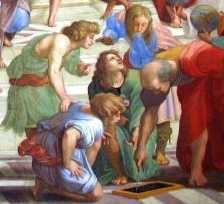This is an alphabetic hymn. Both of the first two lines begin with "A" but then the next lines pretty consistently begin with the next letter of the alphabet, which I have highlighted in red. The third line of the third strophe starts with "clarumque" where "j" and "k" would be in the English alphabet, but I am assuming Latin has no "j" or "k" in its alphabet. (I have seen sometimes "i" written as "j" in older Latin chants; for example "eius" is written as "ejus", but late 20th-century editors seem to have suppressed the "j".) The alphabetical-ness keeps happening through the first four verses, but then ceases in the last verse, the doxology. Father Lentini also points out that this hymn has frequent "assonance:"
Assonance, (or medial rime) is the agreement in the vowel sounds of two or more words, when the consonant sounds preceding and following these vowels do not agree. Thus, strike and grind, hat and man, 'rime' with each other according to the laws of assonance."
(J.W. Bright, Elements of English Versification, 1910)
I don't really see this kind of assonance in this hymn, but maybe somebody could demonstrate what Lentini could have meant when he pointed this out
A Patre Unigénite,
From the Father Thou comest
ad nos venis per Vírginem,
to us, Only-Begotten, through a Virgin,
baptísmi rore cónsecrans
consecrating all by the dew of baptism
cunctos, fide regénerans.
regenerating them by faith.
De cælo celsus pródiens
Down from high heaven proceeding
éxcipis formam hóminis,
Thou receivest the form of man,
factúram morte rédimens,
redeeming by your deaththose whom you made
gáudia vitæ lárgiens.
bestowing on them the everlasting blessedness of life.
Hoc te, Redémptor, quáesumus:
Redeemer, for this we beseech Thee:
illábere propítius,
Flow with mercy (well-disposed)
clarúmque nostris córdibus
into our hearts, Thy bright and
lumen præbe deíficum.
divinizing Light supply/produce there.
Mane nobíscum, Dómine,
Remain with us, O Lord
noctem obscúram rémove,
the nightly darkness take away,
omne delíctum áblue,
all sinwash away,
pie medélam tríbue.
the holy remedy grant to us.
O Christe, vita, véritas,
O Christ, our Life and our Truth,
tibi sit omnis glória,
to Thee be the glory of all,
quem Patris atque Spíritus
Thou whom the brilliance of Father and the Spirit
splendor revélat cáelitus. Amen.
reveal from heaven.
The author of this circa 10th-century hymn is unknown.
